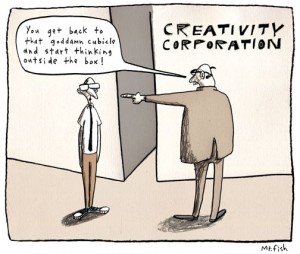Creativity and Health – The Benefits of Embracing Our Inner Artist
Every time I listen to the song “Over the Rainbow” by Israel Kamakawiwo’ole, I begin to day-dream: I imagine myself sitting on a remote beach somewhere in Hawaii, my hair long & dreaded, my dog by my side, not a care in the world. Then suddenly my mom will storm into my room, tell me to get my head out of the sand, and do something useful for once. And so the dream mostly fades, except for the background noise: Ukulele. I want to learn to play the Ukulele.
The desire to play the Ukulele has stuck with me for a while now, but I have yet to pursue it. This is because every time I work up the motivation to chase the dream, discouraging thoughts pop into my mind: “Is playing the Ukulele really a productive use of my time? Shouldn’t I be focused on my work? What if I lose interest, and it goes to waste? “ After asking these questions to myself on repeated occasions, I have come to one shocking conclusion: I am an OLD PERSON.
Every one remembers being a child and asking their parents to do something fun, only to hear the same tired response: ‘I am too old for that.’ We all pledge to never become that way, but sadly, many of us do. So what is the underlying mechanism (aside from age) between this dreaded transition? I would argue that we lose our creativity. In the 2nd grade, 95% of us believe that we are creative. By the time we are the cool kids of elementary school (i.e. 5th grade), only 50% of us claim to be creative. And by the time we are seniors in high school, only 5-10% of us boast creativity.
Somewhere between 3rd/4th grades, most of us learn that it is ‘wrong to color outside the lines,’ and it is this realization that stunts our creativity. As we become adults, this lesson can easily permeate our entire lives. We make less effort to explore new places, cook new foods, or in my case, learn a new instrument, due to fear that it may not be the ‘correct’ or ‘efficient’ choice.
 Here’s the thing: research has shown that taking the time to engage in creative activities is proven to be beneficial to our well-being. Most of know that doing crosswords can help prevent Alzheimer’s disease, or that playing music can improve the immune system by reducing stress. But what most of us didn’t know is that creative activities not only improve our health, but actually increase our work productivity. One study showed that taking breaks during our workday to engage in creative, stress-free activities improves our ability to solve intensely puzzling questions by 20%. In other words, play pays!
Here’s the thing: research has shown that taking the time to engage in creative activities is proven to be beneficial to our well-being. Most of know that doing crosswords can help prevent Alzheimer’s disease, or that playing music can improve the immune system by reducing stress. But what most of us didn’t know is that creative activities not only improve our health, but actually increase our work productivity. One study showed that taking breaks during our workday to engage in creative, stress-free activities improves our ability to solve intensely puzzling questions by 20%. In other words, play pays!
So this is all well and good, but you may still be asking: ‘Where is the time? Playing an instrument sounds great, but learning to play is not exactly an endeavor we can take on during a short break.’ Well I am here to tell you that it is possible. Just the other day, I overheard my sister playing a complex piano piece, and was momentarily shocked because she does not play piano. She told me she watched someone play it in slow-motion on YouTube, and that sometimes when she needs a break, she learns to play songs. My mind was blown. She had learned to channel her inner creativity in a remarkably ‘time-efficient’ way.
With modern technology, there is no reason that adulthood should stop people from channeling their inner artist. You can learn to play an instrument, you can learn to cook exotic meals, you can learn anything you want, and you can likely do it by watching YouTube. You may just find that your health and career thrive because of it.
So it’s decided. I am going to learn the play Ukulele. I hope that you’ll pick up the instrument that you’ve always thought about. Maybe one day we can start a band. Until then, you’ll find me somewhere over the rainbow.
Has a creative hobby helped your health or productivity? Share your experience!
Resources:
How Creativity Works: KQED Forum - http://www.kqed.org/a/forum/R201204041000
Join Our Community
Archives
- January 2023
- December 2022
- September 2022
- August 2022
- June 2022
- May 2022
- April 2022
- March 2022
- February 2022
- January 2022
- December 2021
- November 2021
- October 2021
- September 2021
- August 2021
- July 2021
- June 2021
- May 2021
- March 2021
- September 2020
- August 2020
- July 2020
- June 2020
- May 2020
- April 2020
- March 2020
- February 2020
Subscribe

Sign up to receive FREE toolkit
From Dr. Hyman, #1 NY Times & Amazon Author
We never spam or sell your e-mail




Follow Our Every Move